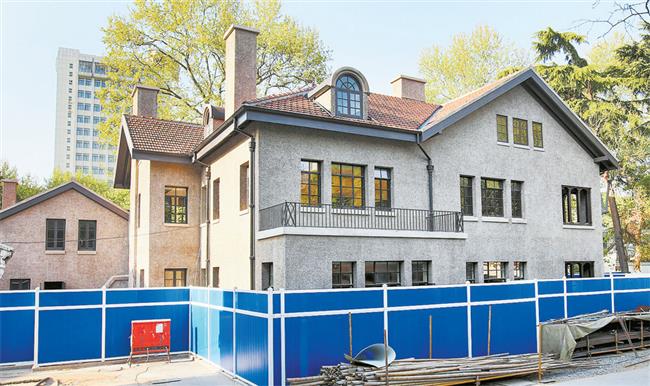Former home of opera master to reopen as learning center

The former residence of Peking Opera master Zhou Xinfang will reopen as opera school.
A renovation project is near completion to convert the former residence of late Peking Opera master Zhou Xinfang (1895-1975) into a public learning school dedicated to opera.
The Peking Opera learning and practicing center on 168 Yueyang Rd in Xuhui District is said to be the first of its kind in China, and will open soon as a major base for amateur Peking Opera lovers to learn the traditional art.
The three-story English-style villa, a listed city-level heritage building, was once home to Zhou, a maestro who enjoys the highest place in the pantheon of Chinese opera greats alongside Mei Lanfang (1894-1961). It later became the offices of the Shanghai Peking Opera Company.
“Each room of the building will be themed on a Peking Opera master where his masterpieces will be taught and practiced,” said Shan Yuejin, director of the company which will operate the learning center. The company has been relocated to its new site on 1198 Tianyaoqiao Rd.
Apart from the villa, the opera learning complex will also include a nearby building, which was once a popular restaurant and has been converted into a small theater and has classrooms for students to learn and perform the opera, and another neighboring structure.
The first batch of nearly 300 students for the center has already been enrolled in 18 classes on various opera roles. They were selected from more than 1,000 applicants.
“I’m looking forward to experiencing the traditional art in the specific structure that embodies the Peking Opera history and elements,” said one of the students.
“Besides, the center’s downtown location is quite convenient,” she added.
The renovation project on the villa started a year ago with the historic house in a state of disrepair due to termite and mold. The cobbles attached on the facade of the house had also dropped, according to the Xufang Group, which is in charge of the project.
Repair work has stabilized the structure and the rooms have been refurbished to their original look when Zhou lived there. Similar cobblestones have been found to fill the gaps on the building’s facade, the group said.
Zhou was born in 1895 in Jiangsu Province into a family of opera performers. He started learning Peking Opera at 6, and made his debut in a child role at the age of 7, thus acquiring the stage name “Qi Ling Tong” or “Age-7 Boy.”
Zhou started performing in Shanghai in 1906, and went to Beijing in 1908. He began performing major roles from the age of 13, and worked with notable opera performers such as Mei Lanfang and Tan Xinpei.
He developed his own unique vocal style, which came to be known as of the Qi style. He served as the first director of the Shanghai Peking Opera Company when it was founded in 1955.
Zhou’s former residence is part of the Xuhui government’s plan to revamp and open its large number of historic buildings to the public. By the end of this year, it plans to finish renovating the former residences of the late playwright Xia Yan and translator Cao Ying.















